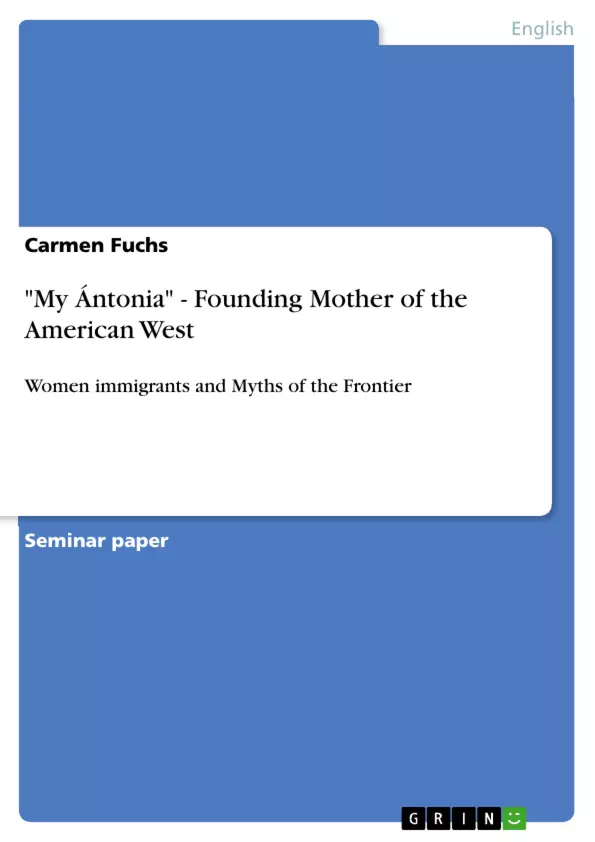The identity of America as a nation is an issue not only amply discussed by politicians and sociologists past and present, it has been a topic of America's writers and artists long since the
country's foundation. In quest of an American identity which was emancipated from its European models 19th century writers were among the first to explore the myth of the American West.
Especially in the early nineteenth century, writers were strongly orientated towards Europe and European writing styles as many young American authors seemingly did not believe their country capable yet of constructing an autonomous literary canon that would reflect a credible literary voice of the young nation. The problem of having no literary home and roots can be copiously observed in the works of Herman Melville, many of his novels and pieces of short fiction featuring the individual's homelessness and the experience of being lost in space and time. Melville wrote about themes which would eventually resurface in the writings of Modernist poets and writers of the 1920s.
Willa Cather, however was accused of being a reactionary because she placed setting her masterpiece My Ántonia in the rural American Midwest. My Ántonia however shows that what many Modernist writers seemed unable to see: the Frontier was not simply a cheesy myth of dime novels but the perfect symbol of America as a nation comprised of the rootless who had no sense of home and for whom moving on was the only solution to this dilemma.
If there ever was an idea of creating an American nation, the Frontier certainly is and was the strongest image of it. It is mostly perceived as a white male myth, and thus Will Cathers offers a different perspective of the Frontier: the role of immigrants and women on the Frontier.
To understand the Modernist writers' general opposition to the Frontier theme and in order to fully comprehend Cather's contribution to American Modernism, one needs to gain insight into various aspects of Frontier literature, namely the Western and the Pioneer Novel. The works chosen for this portrayal are Owen Wister's The Virginian and Hank's Woman and Laura Ingalls Wilder's Little House on the Prairie because of their contrast to My Ántonia regarding the portrayal of women, immigrants and the Frontier Myth.
Inhaltsverzeichnis (Table of Contents)
- Introduction
- The Western: Genre and Gender
- The Pioneer Novel
- Women Immigrants on the Frontier – My Antonia
- On the move: Frontier and American society
- Conclusion
Zielsetzung und Themenschwerpunkte (Objectives and Key Themes)
This text examines the role of women in the American Western, particularly focusing on the immigrant experience and the myths surrounding the American frontier. It aims to analyze how Willa Cather's novel "My Ántonia" challenges traditional Western tropes and provides a nuanced perspective on the Frontier and its impact on American identity.
- The Frontier as a symbol of American identity and the myth of the West
- The role of women, especially immigrants, in shaping the American Frontier
- The evolution of the Western genre and its portrayal of women
- The impact of the Frontier on American society and its significance in American literature
- A comparative analysis of "My Ántonia" with other Western works like "The Virginian" and "Little House on the Prairie"
Zusammenfassung der Kapitel (Chapter Summaries)
- Introduction: This chapter explores the historical context of the American Frontier and its significance in shaping American identity. It analyzes how 19th-century writers grappled with the challenge of creating an autonomous American literary canon and the role of immigration in shaping the nation's identity.
- The Western: Genre and Gender: This chapter explores the evolution of the Western genre, focusing on its portrayal of women. It analyzes how authors like Owen Wister attempted to capture the "true" West in their writings, contrasting their depictions with the romanticized versions prevalent in earlier literature. It also examines the role of the Pioneer Novel in shaping the genre's trajectory.
- Women Immigrants on the Frontier – My Antonia: This chapter delves into Willa Cather's "My Ántonia" and its unique perspective on the Frontier. It explores how Cather portrays the experience of women immigrants and challenges traditional Western tropes by highlighting their vital role in shaping the frontier landscape.
- On the move: Frontier and American society: This chapter further analyzes the relationship between the Frontier and American society. It examines how the myth of the West continues to resonate in modern times and discusses its impact on cultural narratives and identity formation.
Schlüsselwörter (Keywords)
The main keywords and focus topics of this text include the American Frontier, the Western genre, women immigrants, American identity, the myth of the West, "My Ántonia," Willa Cather, Owen Wister, "The Virginian," Laura Ingalls Wilder, "Little House on the Prairie," and the Pioneer Novel.
Frequently Asked Questions
What is the central theme of Willa Cather's "My Ántonia"?
The novel explores American identity through the lens of the Frontier, focusing specifically on the lives of immigrant women in the rural Midwest.
How does "My Ántonia" differ from traditional Western novels?
Unlike traditional Westerns that often focus on white male myths, Cather highlights the vital role of women and immigrants in settling the American Frontier.
What does the "Frontier" symbolize in American literature?
It is a powerful symbol of a nation built by rootless people for whom "moving on" was the solution to the dilemma of having no original literary home.
Why was Willa Cather sometimes called a "reactionary"?
Because she chose to set her masterpieces in the rural Midwest at a time when many Modernist writers were focusing on urban settings and European models.
Who are the key authors compared in this analysis?
The analysis compares Willa Cather's work with Owen Wister ("The Virginian") and Laura Ingalls Wilder ("Little House on the Prairie").
- Citation du texte
- M.A. Carmen Fuchs (Auteur), 2006, "My Ántonia" - Founding Mother of the American West, Munich, GRIN Verlag, https://www.grin.com/document/175133



